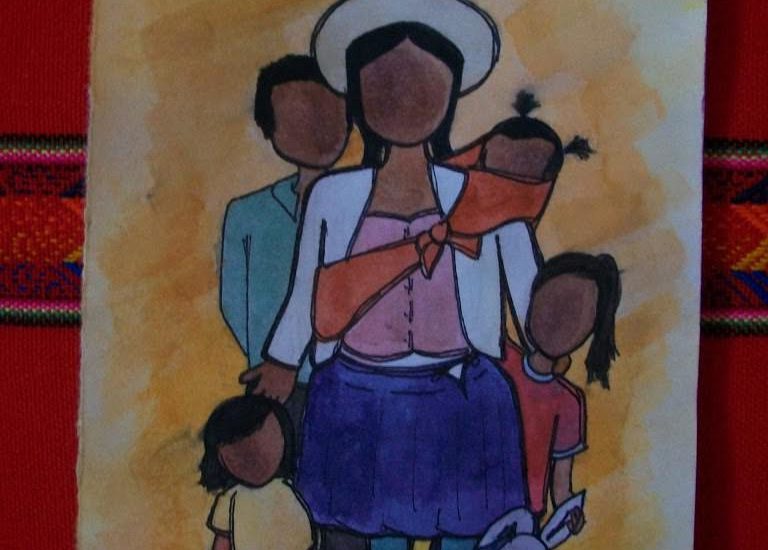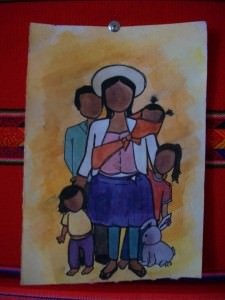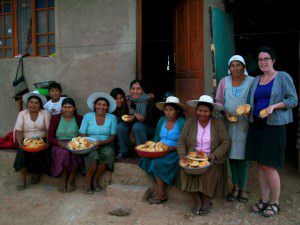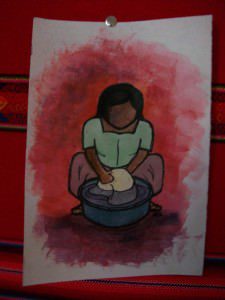Mission Monday: Sharing Stories in Sacred Spaces

 |
| A watercolor by Annemarie that was inspired by the women of Santa Rosa |
First-year missioner Annemarie Barrett reflects on the conversations she has had with the women she has come to know in Cochabamba, Bolivia.
Work. More work. Children. Husbands. Cooking. Cleaning. More cooking and more cleaning. Domestic violence. Machismo. More violence. And no justice.
In two of my primary ministries, I have the opportunity to accompany communities of women, and these are all common themes in the conversations we share together.
One is a Christian Base Community where at least a dozen women between the ages of nine-years-old to upwards of seventy-years-old gather together each Saturday night.
The other is a group of eight women in a rural community called Santa Rosa, south of the parish of Santa Vera Cruz. These women share work with us in the parish garden. They are all mothers and all between 30 and 40 years old.
In these communities, I have the privilege of spending quality time with these women, listening to their stories, their struggles, and learning about how their reality is particularly informed by their identities as women.
In Santa Rosa, I have started baking with the women almost every Thursday in their community in response to their interest in learning more recipes that they can bake for their families or sell in their community.
 |
| The women of Santa Rosa and Annemarie with the pan de leche they baked one Thursday. |
When we bake together there are no men around. And only occasionally do their children pass in and out of the kitchen. When we bake we experiment together by trying bread recipes that are new to all of us. We ask a lot of questions. We share a lot of laughter. And we have time to talk together.
I have heard stories about the pueblos that they lived in before moving to Cochabamba, what they miss about life there and how they chose to move to the city in search of better education for their kids. I have heard about all of the work they do in their homes in order to care for their families. I have seen it, how it seems they never stop cleaning, cooking, folding, etc.
I have also heard how dreary their days can be, in their homes alone, when their husbands are gone at work and their kids away at school.
In the Christian Base Community, we gather every Saturday night in one of the women’s homes and we typically read the Bible together. Just recently we were 16 women total, young and old, scrunched together around a dining room table.
The stories these women share often relate to conflicts within their families or with their neighbors. They share about issues of domestic abuse that they have experienced or witnessed. They share about struggles with their bosses at their jobs, how their voices and needs are not heard or respected.
They also talk openly about machismo, the sexism that permeates the culture here (as it does in the United States and all over the world, for the record).
 |
| Watercolor by Annemarie inspired by the women of Santa Rosa |
And what I am finding over and over in accompanying these women is how sacred these spaces can be. When women have a space to bake together, to socialize together, to read the Bible together, to share their lives together, they are invited to come as they are and they are honored as the authorities of their own experiences.
Under the global machismo culture, women are a marginalized community. We are told in subtle and unsubtle ways everyday that we are lesser. We are told that our experiences are not valid, our work not valued, and our voices unheard.
But in these sacred spaces, where women can find community in company with other women, we can begin to transform that marginalization. We can create spaces that teach us a new narrative, which communicates that as women our experiences are valid, our work valued and our voices most definitely heard and honored.
Tagged in:
